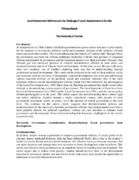| dc.description.abstract | At independence in 1964, Zambia inherited a governmental system whose structure existed mainly
for the purposes of serving the political, social and economic interests of the minority colonial
rulers and other white settlers. This is notwithstanding the rhetoric of “indirect rule” through which
the colonialists outwitted the African traditional leadership with the fake promise of increased
African participation in governance and development matters over their territories. Instead, what
Africans got was increased presence of colonial administrative officials in rural areas, and
increased colonial control of African chiefs and headmen. At that time, as was the case with many
other new countries, one of Zambia’s daunting tasks was that of nation-building through
accelerated national development. This could not be achieved in the void of clear political, social
and economic policies and laws. Consequently, national development was to be pursued through
various structural reforms on the political, social and economic frontiers. One of the most
important of these was the decentralization reforms which were first birthed by the promulgation
of the Local Government Act, 1965. Since then, the Zambian government has made several other
attempts at decentralizing various aspects of governance. The most important of these have been
the Local Administration Act (1980) and the Local Government Act (1991), and the various policy
reforms promulgated over the years. This article argues that notwithstanding these various legal
and policy initiatives, Zambia remains a highly centralized country with façades of local
government institutions which, in reality, serve the interests of central government at the local
level. The evidence in this article clearly suggests that decentralization policies and
pronouncements by the successive Zambian government officials since independence have been a
mere populist rhetoric for political expediency without any real intention to enhance local
governance and development. Some historical and political reasons, highlighted in the article,
account for this. | en_US |

